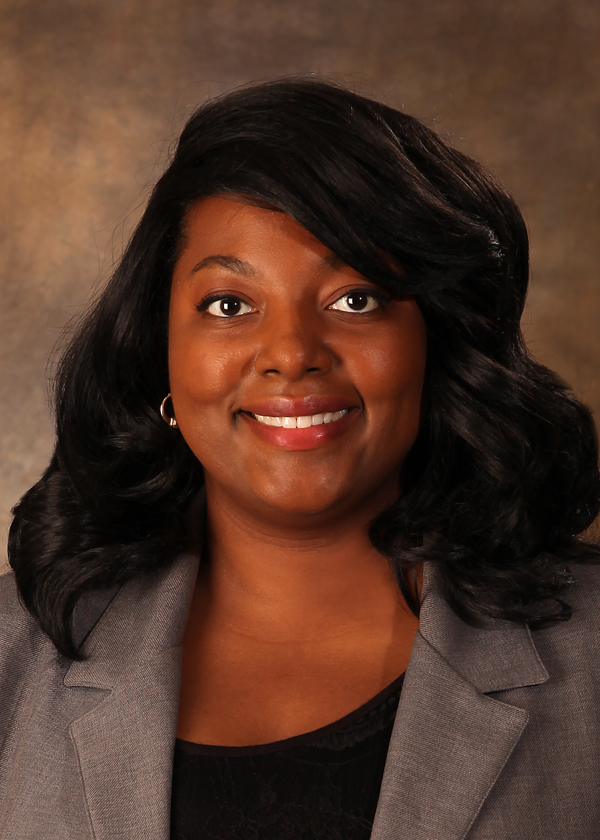Attorney Ketura Baptiste, AB '03, represents indigent persons, domestic violence victims, and senior citizens in Illinois. As she shares in this Q&A, her undergraduate degree in psychology still plays a role in how she approaches her clients and her work.

Tell us about your career path post-WashU.
I am currently the managing attorney of the Kankakee Office of Prairie State Legal Services, Inc. (PSLS). PSLS is a legal aid firm representing indigent persons, domestic violence victims, and senior citizens in Central and Northern Illinois (excluding Cook County). The Kankakee Office offers free civil and administrative legal services to eligible residents of Kankakee and Iroquois Counties.
Our office is located about four hours from the WashU Danforth Campus. Three attorneys are responsible for the administration of free legal services for more than 30,000 eligible clients. We provide a range of services from education, advice, transactional work, and full scope litigation depending on the facts of an individual case and the resources available in the office. We focus our services on helping clients meet their most urgent basic needs, like housing, freedom from violence, medical care, food assistance, and the like.
Our office receives support from PSLS firm-wide and from the local bar association. PSLS telephone counselors complete many of our initial screenings. Also, about half of the local Kankakee and Iroquois County attorneys volunteer to represent eligible clients with pro-bono cases. We have a Pro Bono coordinator in the office who is responsible for referring cases to local attorneys.
The Kankakee Office takes proactive steps to provide holistic services to our clients. We work with several social service agencies to fill in gaps and meet needs outside the scope of legal work. For example, clients who find themselves in legal trouble often have accompanying economics and lifestyle needs that are best addressed by other members of the local safety net. Our office works closely with agencies like Harbor House (the local domestic violence advocacy group) and Options Center for Independent Living (a local disability advocacy group) to address non-legal needs as they come. We may refer clients escaping dangerous households to the Harbor House domestic violence shelter. We may refer another client to Options for assistance with a disability benefits application or for help with paying a month’s rent.. Because resources are scarce in our community, PSLS participates in various multidisciplinary groups and councils to coordinate ways to maximize the available resources. As a group, we attempt to make the biggest impacts possible in the lives of our clients.
I learned some very important life lessons in my courses, including lessons I share with clients. One of the most important lessons is to be “unafraid to contradict yourself.” I have advised clients that abusers attempt to pigeonhole them into repeating patterns, but it is perfectly okay to say “that was then and this is now.”
How has studying psychology impacted what you do now?
There is a “not so inside joke” that I share with many practitioners in my multidisciplinary teams. We all (not really all) have a BA in psychology. I took various psychology, philosophy, and cultural anthropology courses at WashU. Many of the courses dealt with cultural problems like poverty, racism, and bias. One of my favorite books on poverty, Nickel and Dimed by Barbara Ehrenreich, was assigned reading for one of my WashU classes. I have read it several times and just re-read this year. Nickel and Dimed, I feel, is mandatory reading for anyone working with indigent populations. The stories humanize and normalize “the working class.”
I learned some very important life lessons in my courses, including lessons I share with clients. One of the most important lessons is to be “unafraid to contradict yourself.” I have advised clients that abusers attempt to pigeonhole them into repeating patterns, but it is perfectly okay to say “that was then and this is now.” You have the right to change your mind, to evolve, and to say no even after you have said yes. Law school teaches the opposite lesson – the past is prelude. Perhaps that BA in psychology simply makes me okay with cognitive dissonance.
In my Social Security Disability practice, I think back often to my “Abnormal Psychology” course and the various diagnoses. I use the Diagnostic and Statistical Manual of Mental Disorders fairly routinely along with the Social Security Administration’s Blue Book / Impairment Listings.
Most importantly, my psychology coursework demystified human behavior and helped me to think critically about the systems and paradigms governing our culture. (It also taught me not to make vast generalizations, and yet here I am.)
You have the right to change your mind, to evolve, and to say no even after you have said yes. Law school teaches the opposite lesson – the past is prelude. Perhaps that BA in psychology simply makes me okay with cognitive dissonance.
What are the main challenges facing the community that Prairie State Legal Services serves?
Because indigence is our primary criterion for eligibility, unsurprisingly, poverty is the main challenge to our client pool. With poverty often comes the usual sets of symptoms – lack of educational opportunity, history of contact with the criminal justice system, housing instability, etc.
The 2017 Legal Services Corporation’s “Justice Gap Report” published on www.lsc.gov asserts that “over 60 million Americans have family incomes at or below 125%” of the federal poverty level. From those numbers, “71% of low-income households experienced at least one civil legal problem in the last year, including problems with health care, housing conditions, disability access, veterans’ benefits, and domestic violence.” It is very rare, however, for a legal aid client to have just one legal issue. By the time the situation gets dire enough to reach out to legal aid, applicants are facing multiple obstacles to achieving stability.
Foreclosure and eviction clients often come with income maintenance and criminal background issues. We have assisted clients secure township financial assistance and social security benefits that have saved their housing. We have assisted clients to clear criminal backgrounds to improve their chances of securing housing.
Domestic violence cases often have income maintenance and additional family law matter issues – in addition to the domestic violence protective order, a client also often needs a divorce, parentage, and child support cases. Family law cases involving children often take months to years to resolve and can include complicated interstate issues like parental kidnapping. Our office has coordinated efforts with law enforcement all over the country and the National Center for Missing and Exploited Children to return children to Illinois.
The Kankakee Office has prepared Victims' Economic Security and Safety Act correspondence to employers who have threatened or taken action against clients who have had to attend court to participate in their domestic violence cases. Because legal aid clients often lack income and assets, they often cannot afford (literally) to take time off of work to address important legal issues, even domestic violence. Many low paying jobs (such as the jobs that are deemed “essential” in the COVID-19 pandemic) have strict attendance requirements. Some can be left with the choice of going to court or going to work to earn that last $68 necessary to make rent for one more month.
How has COVID-19 impacted this community, particularly in relation to evictions?
In Illinois, the governor imposed a moratorium on non-payment evictions until late August 2020. The Illinois Supreme Court further issued an Administrative Order setting guidelines for evictions and foreclosures based on the federal CARES Act. Kankakee and Iroquois counties (both part of the 21st Illinois Circuit) adhered to the eviction filing stay imposed by the governor’s executive orders. When the moratorium ends, however, we anticipate a dramatic influx of eviction cases.
Our local office had very few eviction violation issues arise during the pandemic shutdown. We had one landlord attempt to force a tenant out earlier this summer, but we had the local police intervene on behalf of the tenant. We eventually settled the parties’ issues. Eviction is a particularly insidious poverty law topic in that on its surface it often looks like a simple contract dispute. Evictions are, however, often the culmination of many blows suffered by the tenants (loss of income, domestic violence, medical issues, public benefits issues, etc.). Evicted tenants are often unable to simply pack up and move to the next location. An eviction is often an economic stain that prevents the tenant from finding other suitable housing. In Matthew Desmond’s 2017 book Evicted, he laid bare some of the ugly truths behind the eviction process – from families having to start over from scratch once their personal property is placed on the curb, economic hardship that force families into dangerous living situations, to having to move several times before finding suitable shelter once a tenant is evicted. Desmond proposed that evictions have been “linked . . . to heightened residential instability, substandard housing, declines in neighborhood quality, and even job loss.” These are facts that we are very concerned about as mass evictions start at the end of August 2020.
How have the protests against police brutality and racial injustice impacted your work?
Legal training requires attorneys to focus on specific elements to prove or defend against claims. In the majority of civil suits and administrative cases, race is not an element. When race is not an element, the prevailing position is that race is simply not brought up. Being a black woman in the legal profession, I have often wondered about the role race plays in negotiation and litigation outcomes. My race, the race of parties to the suits, and the race of the trier of fact. The issue has been heavily researched and written about in the criminal justice context. Some good pieces, such as Sara Sternberg Greene’s 2014 paper "Race, Class, and Access to Civil Justice," tackle the civil aspect. Reading about it, however, is not the same as living it.
This summer’s racial unrest made it abundantly clear that various steps PSLS already started were important and necessary. Several years ago, PSLS started a Racial Justice Taskforce to address the role race plays in our casework and the firm culture. Since then, we have had several in-house trainings on implicit bias, micro-aggression, race-based Fair Housing issues, and other discrimination based suits. We have increased our focus on analyzing the impact of racial discrimination in our client’s cases, ranging from education to housing. The firm planned several small group discussions to grant employees the opportunity to discuss this summer’s racial issues. Some staff members have met to create proposals to offer to senior management on ways to move forward.


